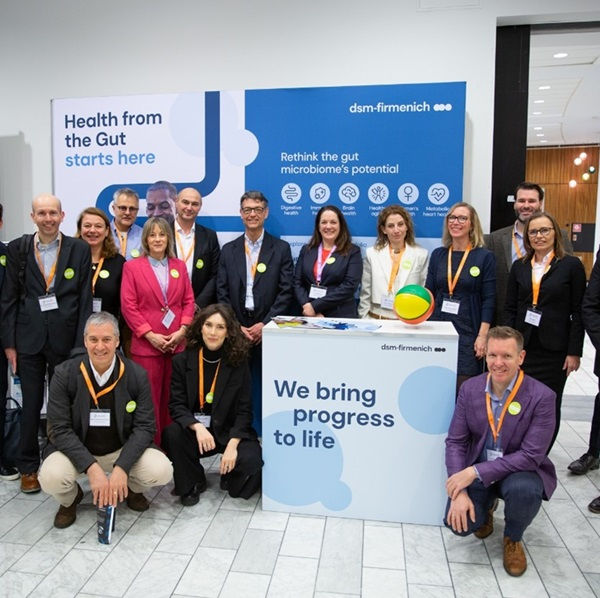News
October 15, 2019
Ask the Expert: Why now is the time to invest in supplements for menopause health
Changing attitudes and greater awareness of menopause has brought new opportunities within the dietary supplements market. As an example, we look at how Fruitflow®, a nutraceutical ingredient that addresses cardiovascular health, can help women maintain their cardiovascular health advantage for as long as possible.

Ask the Expert: Why now is the time to invest in supplements for menopause health
- Women face a number of hormonal changes during menopause that can lead to an increased risk of health concerns such as cardiovascular disease.
- Changing attitudes and greater awareness of menopause has brought new opportunities within the dietary supplements market. Product developers are now looking to fill the gap in the market for nutritional products offering menopause health benefits.
- In conjunction with World Menopause Day, Niamh O’Kennedy, scientific expert on Fruitflow®, a nutraceutical ingredient that addresses cardiovascular health, has answered questions around the health issues associated with menopause and how the supplement market can help women maintain their cardiovascular health advantage for as long as possible.
Why menopause is increasingly a hot topic
During menopause, declining estrogen levels can result in women experiencing both physical and mental changes. This can make menopause a challenging time for many women.
In recent years, there has been a growing focus on menopause health. As more women are willing to speak out about the changes they have experienced, others are encouraged to seek help for similar issues.
Here, Niamh O’Kennedy, scientific expert on Fruitflow®, a nutraceutical ingredient in dsm-firmenich’s portfolio that supports a healthy heart by contributing to healthy blood flow, discusses the shifting attitudes towards menopause, its accompanying health issues and nutritional solutions.
Why do you think the menopause has become such a hot topic in the dietary supplements market?
Menopause has been receiving an increasing amount of attention as a health concern that needs to be taken seriously. The number of women affected worldwide at any one time is enormous, as perimenopause (menopause transitional stage) can typically start anywhere from 35 years of age onwards.
It is now possible that a growing number of women could spend almost half of their life in menopause or post menopause. This is a significant consequence of improvements in healthcare, as prior to the 20th century, most women would not have experienced the effects of menopause for longer than a few years.
The change in life expectancy has significantly altered the pattern of women’s health risks later in life. This has, however, led to an increased understanding in the medical profession that menopause is not just a ‘change’ in hormones that women have to endure, but a serious consideration for maintaining their long-term health and wellbeing.
Shifting attitudes have also been accelerated by the voices of women themselves, no longer willing to undergo what can be a very difficult process of both physical and mental changes in silence. We’ve also seen a rise in organizations, such as MegsMenopause – an information source for women facing menopause, committed to helping women to realize that they can, and should, ask for help.
All of these factors have brought opportunities for the dietary supplements market. This includes the development of new ingredients and finished products that address the physical and psychological symptoms of menopause and help reduce the risk of some of the health problems associated with post menopause, like heart disease and osteoporosis.
What are the latest developments relating to menopause health?
There are a wide range of issues, trends and topics relating to menopause. This includes the use of body-equivalent HRT (hormones matched to the natural hormones women produce, rather than the synthetic mimics originally used in earlier treatments), and the difficulties many women have in accessing this treatment. The psychological effects of the menopause, and ways to help overcome symptoms of depression and mood changes are also an important topic.
The importance of informing and educating women before they reach menopause is key, as this has implications for long term health. This is why awareness days, such as World Menopause Day, are so integral, as they encourage open conversation.
Another big focus is highlighting the cardiovascular implications of the menopause, as this has emerged as something that most women do not really understand, so the importance of conveying this during perimenopause is also on the agenda.
Why is Fruitflow® such a promising ingredient for menopausal women?
Fruitflow® can provide essential support for women from perimenopause onwards. It can help to keep blood platelets from becoming overactivated at a time when the natural protection, conferred by estrogen, is in decline.
High levels of oestrogen from puberty onwards mean that women typically have better cardiovascular health than men. This means that women who suffer from a stroke or heart attack tend to do so about ten years later than men do, which is partly due to the protective effects of estrogen they have earlier in life.
However, with the reductions in estrogen that start in perimenopause, a woman’s cardiovascular risk rises significantly. The aim is to keep platelets smooth to support healthy circulation, benefiting the overall cardiovascular system and helping women maintain their cardiovascular health advantage for as long as possible. You can find out more in the recent interview with Ruedi Duss, Global Marketing & Business Manager at dsm-firmenich, where he discusses how Fruitflow® addresses these risk factors.
How can the dietary supplement industry provide better menopause health solutions?
While there’s no overarching solution for the issues women in menopause face, shifting attitudes, including the founding of organizations such as MegsMenopause, are really helping women get more psychological and physical help.
As this awareness grows, many women are on the look out for supplements and functional foods that can help combat associated health problems. Here at dsm-firmenich, we are committed to providing solutions to support health and wellness during menopause.
References
- Access EFCNI "Socks for life - 1 baby in 10 is born premature. Worldwide", 2018 [file]
- Visit World Health Organization "Preterm birth" website to learn more
- Shah et al. The Canadian Preterm Birth Network: a study protocol for improving outcomes for preterm infants and their families. CMAJ Open 2018.
- Liu et al. Global, regional, and national causes of under-5 mortality in 2000-15: an updated systematic analysis with implications for the Sustainable Development Goals. Lancet. 2016;388(10063):3027-35.
- Middleton et al., ‘Omega-3 fatty acid addition during pregnancy’, Cochrane Database of Systematic Reviews, 2018.
- Access EFCNI "Breastfeeding a preterm baby", 2018-2019 [file]
Related Content
Recommended Reading
-

2 April 2025
The gut microbiome as a pathway to supporting children with autism: New study reveals synbiotics' dual benefits for digestive and behavioral symptoms
-

11 March 2025
What's next for gut health? 5 breakthrough trends from Probiota 2025
-

12 February 2025
Unlock mineral bioavailability: How phytase breaks through absorption barriers
Quick links
Customized blends of functional ingredients in one single, efficient premix.
Streamline your product development process and get to market faster.
From trade shows to conferences and other industry events, find out where you can meet us next.
Talking Nutrition, Health & Care
Explore new science, consumer insights, industry news and more in our latest articles.
Discover educational whitepapers, webinars, publications and technical information.
Request samples, place orders and view product documentation.